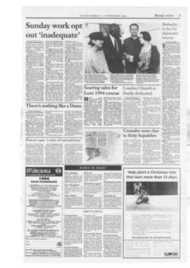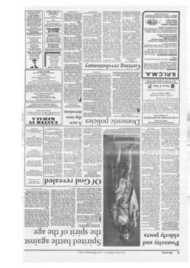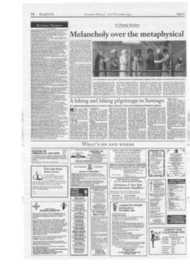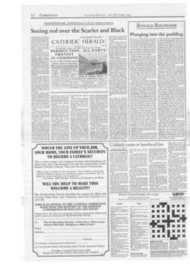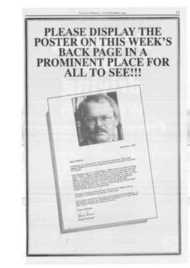Page 3, 10th December 1993
Page 3
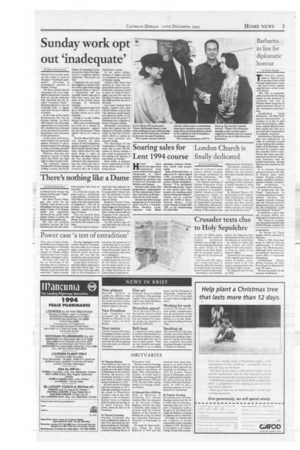
Report an error
Noticed an error on this page?If you've noticed an error in this article please click here to report it.
Tags
Share
Related articles
Mps Seek
Sabbath
Lords Ruling A Victory For `family Life'
Sunday Trading Law Upheld
Mps Are Told: `keep Sunday Special'
Sunday work opt out 'inadequate'
BY ANGUS MACDONALD
PROTECTION FOR SHOP workers who refuse to work on Sundays is "hopelessly inadequate", according to campaigners opposed to Sunday Trading.
The Keep Sunday Special Campaign this week highlighted independent research from two top law academics who concluded that the socalled "conscience clause" allowing employees to opt out of Sunday work is complicated and will prove difficult to enforce.
In the wake of this week's Parliamentary free vote on Sunday trading in which MPs voted for one of the three options laid out in last week's bill attention has re-focused on the provisions for protecting workers, a late concession by the government.
Under these provisions, shop workers are protected against dismissal or detrimental treatment for refusing to work on Sunday, provided they give three months notice.
However, they may also choose to "opt in", at which point they forfeit any legal right to refuse Sunday work.
Top university lawyers Professor KD Ewing of King's College, London, and Dr SF Deakin of Cambridge University say the detail of the legislation is weighted against employees. They point out that: . Employers are not under any obligation to inform workers of their rights before trying to persuade them to "opt in".
. Employees will not normally receive legal aid to fight their cases, and face many of the in-built disadvantages of industrial tribunals.
. They must prove that it was their refusal to work on a Sunday which led to their dismissal.
. Casual or "on call" workers will not be protected.
MPs voted overwhelmingly last week for a change in current legislation approving the Government's "three option" bill by 311 votes to 26.
The bill offered MPs a free vote between the three options of total deregulation, partial deregulation and the Keep Sunday Special regulations, which allow for only small shops to open on Sundays, and larger shops on the four Sundays before Christmas.The critical deciding vote, which was due to take place on Wednesday, occurred after the Catholic Herald went to press.
At the earlier debate, mention of religion was kept to a minimum by opponents of Sunday trading.
Catholic MPs feared that mention of their own religious beliefs could be counterproductive, choosing instead to focus on shop-workers' rights, pay, and the need for Sunday to be kept as a family day, different from the rest of the week.
Last week, Cardinal Basil Hume, together with other Church leaders, warned that "the spiritual, psychological and physical health of the country would be poorer" if Parliament was to legislate in favour of Sunday trading.
Meanwhile, environmentalists have warned that the expansion of Sunday trading could set back the Government's efforts to combat air and noise pollution and conserve energy.
The Association for the Conservation of Energy estimates that an extra 500,000 tonnes of carbon dioxide a year could be generated by the heating and lighting of most shops on Sundays.
More traffic, as shoppers drive to superstores and extra lorries deliver goods, is also being forecast.
blog comments powered by Disqus




